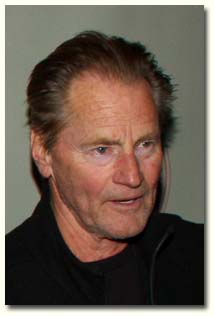|

At age 67, Sam Shepard has six films in various stages
of production, he's writing a new play, and it's obvious
that working hard agrees with him. In person, he
positively glows - and he definitely looks 20 years
younger than he does in his new film "Blackthorn",
opening on Friday, October 7.
The film tells the apocryphal story of what might have
happened had Butch Cassidy escaped death in 1908,
retired to a secluded Bolivian village under the alias
of James Blackthorn. Eventually, he attemps to return to
America to see his son - where on the way he meets a
young criminal (played by Eduardo Noriega).
"I really wanted to play this part," says Shepard. "It
was just the best script I'd seen in maybe ten years -
it's so beautifully made on the page - and I knew from
talking with Mateo Gil, the director, and Miguel Barros,
the writer, that it wouldn't be just another Western. It
has all those wonderful twists and turns. It's
continually surprising."
As a writer himself, was he ever tempted to tamper with
the script? "I usually don't mess with a script when I'm
acting, but I do always make sure they know I might fool
around with my dialogue just enough to make sure it's
right for my character," he answers quickly.
Working in Bolivia presented a mixed bag of pleasures
and problems, Shepard recalls. "We spent five or six
weeks there with hardly any money, but I've never seen
such vistas, they're magnificent," he notes. "And we got
them just right thanks to Juan Ruiz Anchia's
cinematography; there's absolutely no CGI in the film,
which makes some of those shots even more remarkable.
Plus I got to ride and work with some great Spanish
wranglers; I never worked with any better. However, the
altitude was especially hard on the horses."
The film reunites him with his longtime friend and
collaborator Stephen Rea - the pair first worked
together at the Royal Court back in 1971 - who plays
Mackinley, a retired lawman who always thought Cassidy
might still be alive and who is a kind of drunken Javert
to Shepard's Jean Valjean. "We were pretty much the only
English speakers on the shoot," he says. "Eduardo
actually doesn't speak much English at all, so his lines
were mostly learned phonetically. But you really can't
tell, he's such a good actor."
While acting takes up much of Shepard's time these days,
he hasn't abandoned his first love. He recently had a
six-month residency at the Santa Fe Institute in New
Mexico, where he spent some time working on a new
three-act play to be produced next year by New York's
Signature Theater.
And on October 17, he will become the first recipient of
LaMama's new Annual Ellen Stewart Award, named after the
late founder of the East Village theater where Shepard's
early works were produced. "Ellen was a generous woman
in every respect," he recalls fondly. "She was a New
Orleans Creole, so distinctly herself in every way, the
way she spoke, the way she dressed. She would just let
people come and stay at the old LaMaMa down on Second
Avenue - above where Stomp is playing now," he recalls.
"Ellen was so great, I could bring her any old thing I'd
written on the back of an envelope and she'd say 'Let's
do it Baby!' We did two one-act plays first, Dog and
Rocking Chair, but they're lost now," he says. "By
tremendous luck, I just happened to end up in the right
place!"
|